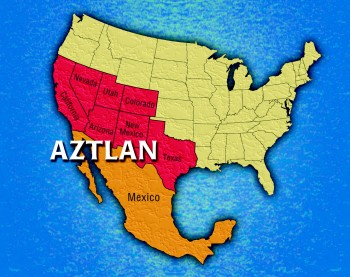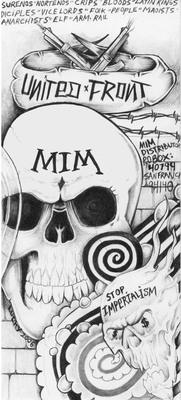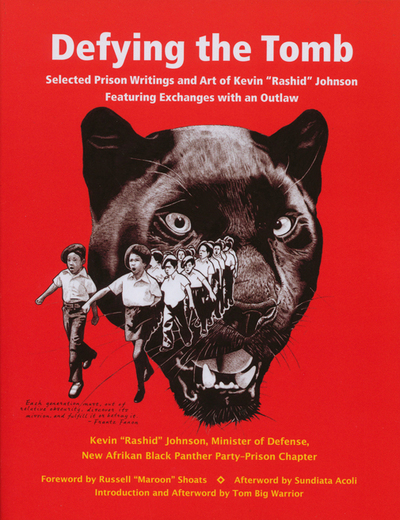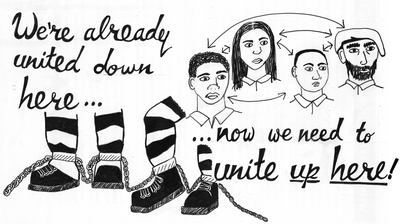
Response to "Time for Peaceful Revolution"
As a member and a strong representative of the ALKQN, I would like to thank ECC.1:1 for understanding/recognizing that the Time for Peaceful Revolution article printed in ULK 17 left more questions than answers.
This particular attempt for a peaceful revolution reminds me of a specific religion claiming to be the most righteous group, but then turn around and bash another religion, spending all their time and energy preaching hatred.
As the Nation Man that I am, I’m obligated to correct and respond to the Komrade’s article, in an attempt to enlighten and educate those that do not have a proper understanding of the ALKQN. Because a real righteous person will not only strive for perfection, but will also take time to help, hope or pray that the next person will get on the right path.
I am very well aware of, and advocate, revolutionary criticism. I encourage all types of criticism from all walks of life. However, in order to give a positive or negative criticism, it is important that one has the correct knowledge of the subject they are criticizing, and from reading the komrade from New York’s article, it’s obvious that not only does he not know the true purpose of Kingism, but he also failed to build on a peaceful revolution.
The ALKQN was founded in 1940, not by Lord Gino Gustavo, but by (RIP) King Gentle. The five principles/points of the Holy Crown are Love, Honor, Obedience, Sacrifice and Righteousness. The purpose of the ALKQN is to promote prosperity and freedom through love and understanding to all oppressed people of the world; to train our people to become aware of our social and political problems and of the conditions that we are subjected to live under as a third world people; to provide the aid and way in our search for peace and unity; and to promote and encourage educational and vocational learning in order to train our people in the art of survival.
In the early stages of Kingism, the title was just Almighty Latin Kings Nation. It wasn’t until the sixth decade of the twentieth century that the title ALKN changed to Almighty Latin Kings and Queens Nation. The ALKQN is a global organization with chapters all around the world, and to say that New York was the first state to recognize and acknowledge our beautiful sisters as Queens is just false. Diana Rodriguez, who was born and raised in Chicago, played a major role in the 60s for the sisters in the struggle and the Nation.
Although this Komrade expressed personal feelings, which created more confusion then solutions, I do believe some good came out of this publication, because it definitely caught the attention of many Komrades in New Jersey’s Department of Corrections. It is definitely time for peaceful revolution, because through violence alone we as lumpen organizations will only achieve but so much and get but so far in our quest for liberation, peace and justice.
Today’s struggle and oppression is not so much as it was in the 50s, 60s and 70s. In that time we faced a more physical oppression, with police brutality and so forth. Not to say that police brutality does not exist today, because it certainly does. However, in today’s materialistic society, we face a more psychological aspect of oppression. And after being pushed and beaten so many times, one just pushes back with the use of violent defense. But when faced with psychological oppression, how can we expect one to fight back when one isn’t mentally strong enough to resist such an oppressive tactic? And for this very reason, we must create a peaceful revolution, and education is the key that will liberate us from our mental shackles.
I’m sure the Komrade from New York is trying to point out the fact of the ever growing problem of police collaboration, which is a major problem in our quest for progress in any lumpen organization. However, I would like to add that one must not live life with resentment, as it is a proven fact that it can eventually take a toll on one’s life.
In conclusion, I accept all feedback for a peaceful revolution. I believe all lumpen organizations should come together in unity and stand firm in our quest for peace, justice, freedom, progress and prosperity.
ECC.1:1 of ALKQN/PLF responds: To the representative of the ALKQN-NJDOC sub-region and furthermore to all members of the lumpen organization (LO) in question, the following “feedback” is for all of us, as natural allies, together, to chew on and digest:
First and foremost I want to stipulate that it is the essence of the following statement around which future dialogue should be provoked throughout this nucleus of ours. In the above response the representative states that “it is important that one has the correct knowledge of the subject they are criticizing, and from reading the comrade from New York’s article [see ULK 17 for said article, titled Time for a Peaceful Revolution, which was written by a third party and criticized by both the above representative and myself], it is obvious that… he [does] not know the true purpose of Kingism…” The representative goes on to address certain characteristics of our organization such as the stated purposes of our organization as listed in our organization’s Chapter Constitution; the principles listed therein, as well; and a bit of history concerning the constantly debatable year of our founding and just exactly who or whom founded the same. This statement should be used as the stepping stone for our developing discussion due to the perpetually subconscious question mark so many of us “representatives” have in relation to such things as our “true” history (accounts vary depending upon where and by whom you were coronated). Similarly, and more importantly, we lack a clear and concise political line drawn from the KM/C(King Manifesto and Constitution) and upheld by some form of a centralized body made accessible to the entire organization itself, as opposed to the conceptual authority on a national level that today, for all intents and purposes, seems to be more illusory than real.
In the above response the representative (and I use this title respectfully) brings up the more violent, defensive tactics of the (North Amerikan?) struggle of the 50s, 60s and 70s, in the face of their (perceptually) physical oppression of “that” time. Without getting into the stark and violent physical oppression being inflicted upon the people of the Middle East (Third Worlders who constitute “our people” as dictated by the KM/C and therefore constitute the very real, physical oppression we are experiencing, as a whole, right now, today…) I will attempt, for the most part, to construct my address around the (assumably) ideological justifications of the above author’s advocacy for a “peaceful revolution” as a representative of the LO in question, and do so from the starting point of a very interesting section of the KM/C itself which, I might add, by the way, was written to serve as nothing more consequential than a “guide.”
For (s)he who knows and knows that (s)he knows… the section of the KM/C titled “Fearlessness” is almost a verbatim, word-for-word quote of Mohandas Gandhi (see Gandhi, Selected Writings) who was the progenitor of “Satyagraha,” or non-violence – the “peaceful revolution,” if you will. But does this mean that we, as members of the LO from which the KM/C was written, should all of a sudden and wholeheartedly adopt the methods of Satyagraha? No! And the reasons are multifaceted. True, an in-depth research of the KM/C will discover a plethora of influences, all related to “revolution” in one form or another. Remember, the KM/C is but a “guide,” a field-manual, if you will, of sorts. And for those of us passing before the Turning Wheel of Change who think we know what Gandhi’s message fully entailed, but don’t (and who would assume a certain indication as a result of the above revelation), here’s another quote of his, and one to dissipate any illusions, for these are his words as well:
He who cannot protect himself or his nearest and dearest or their honour by non-violently facing death, may and ought to do so by violently dealing with the oppressor. (ibid)
Ahora, let’s take another revolutionary/historical influence. While Gandhi was indeed a pacifist by all means, Ernesto “Che” Guevara was an advocate of armed struggle, bar none. And where exactly does any portion of his particular philosophy fit into the teachings of the KM/C? How about within and throughout the very core of the KM/C itself? In reading Guevara’s Socialism and Man in Cuba one will not only find the New Man - New King reproduction but the actual blueprint (pre-, pending-, post-revolutionary war consciousness of the individual) for the class-based three stages of “Reyismo”: primitive, to conservative, to either an accomplice to the anti-King system or a New King (or Queen), which in even more political terms is read as lumpen-proletariat, to proletariat, to either labor aristocrat/national bourgeoisie or Third World internationalist/revolutionary. But does this mean that we should all of a sudden and wholeheartedly (blindly) adopt the methods of, say, “focoism,” Che’s theory that the masses will be inspired to overthrow the oppressor’s regime at the guerilla’s declaration and launch war against the same? No!
What then, exactly, does all this mean? Gandhi or Che? Armed struggle or Satyagraha? Violence or non??? Neither. What it means – and this is the culmination of my address to, and call for, further dialogue amongst the Subjects of Decision to whom this appeals – is that 1) yes, “the time for revolution is at hand… a revolution of the mind, the revolution of knowledge, a revolution that will bring freedom to the enslaved;” but that 2) this “revolution of the mind,” this “revolution of knowledge,” is neither simply just a polar shift from one extreme to another (i.e. violence to non-violence) nor evident in the rising of ones GPA, per se, but an actual, dynamic, radical and revolutionary change in our world outlook to the “Almighty Eye” that now sees through the lens of dialectical and historical materialism; and 3) that this, that or any other form of “revolution” to be applied at any given time or place (all things considered and compared) should and must be determined not by any one particular representative, capítulo and/or region of the Federation alone, submerged within the context of their own reality, but by an organized body of professional revolutionaries, a vanguard party of the intelligentsia, the political cadre studied in the science of Marxism and found throughout the entire Nation/LO in question, as a whole.
Revolution is both ever-pliable and omnipresent, so such questions as “violence or non-violence” should not be asked in search of a cure-all method or application of resistance but, at the very least, should be considered based upon the objective and subjective conditions of any given situation, place and/or time of the entire movement, as a whole, in flux. Yet, before we can even begin to ask “when and where,” we must first ask “by whom and how” should such decisions be both determined and detailed for either the execution and or debate of all those considered, and in accord? The principal question then boils down to this: a Leninist vanguard-style political party within the LO in question (and this could mean any LO in question) or a continuation of confusion, uncertainty, mis (and a lack of) communication and both the overwhelming atmosphere of counter-revolutionary conduct and the ever discouraging counter-revolutionary calls from those “above.”
The debate has already begun within our particular LO alone (as well as within others) and is active in a number of states. To those of the ALK(Q)N who are familiar with Leninist party-building and his work titled What is to be Done? the call for your sanctioning power, the weapons and shields that are your words and ideas - the power to create - is being sounded. I look forward to pushing this conversation forward with more of you within the pages of Under Lock & Key (ULK).
And so I close, with a bon-apetite, and both a special appreciation for the response made by the representative above and a complimentary mint to top things off, served up by Chairman Mao himself, so as to give those first-time ULK readers something further to consume:
We are advocates of the abolition of war, we do not want war, but war can only be abolished through war, and in order to get rid of the gun it is necessary to take up the gun.
Related Articles:This article referenced in:












